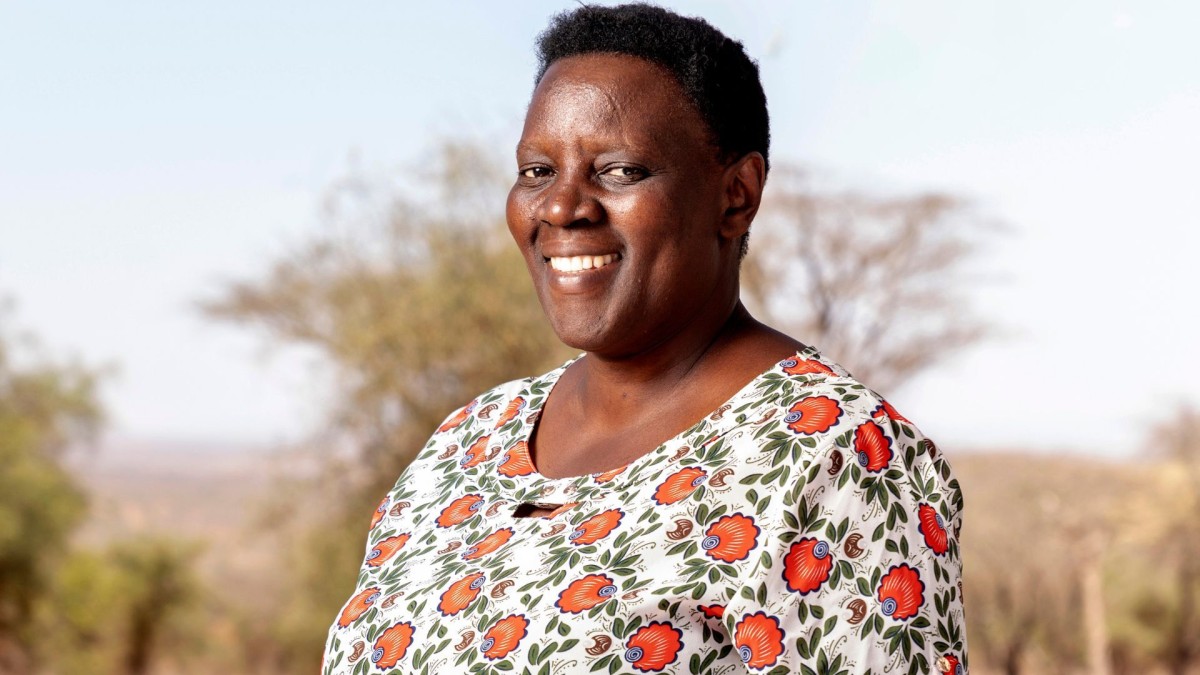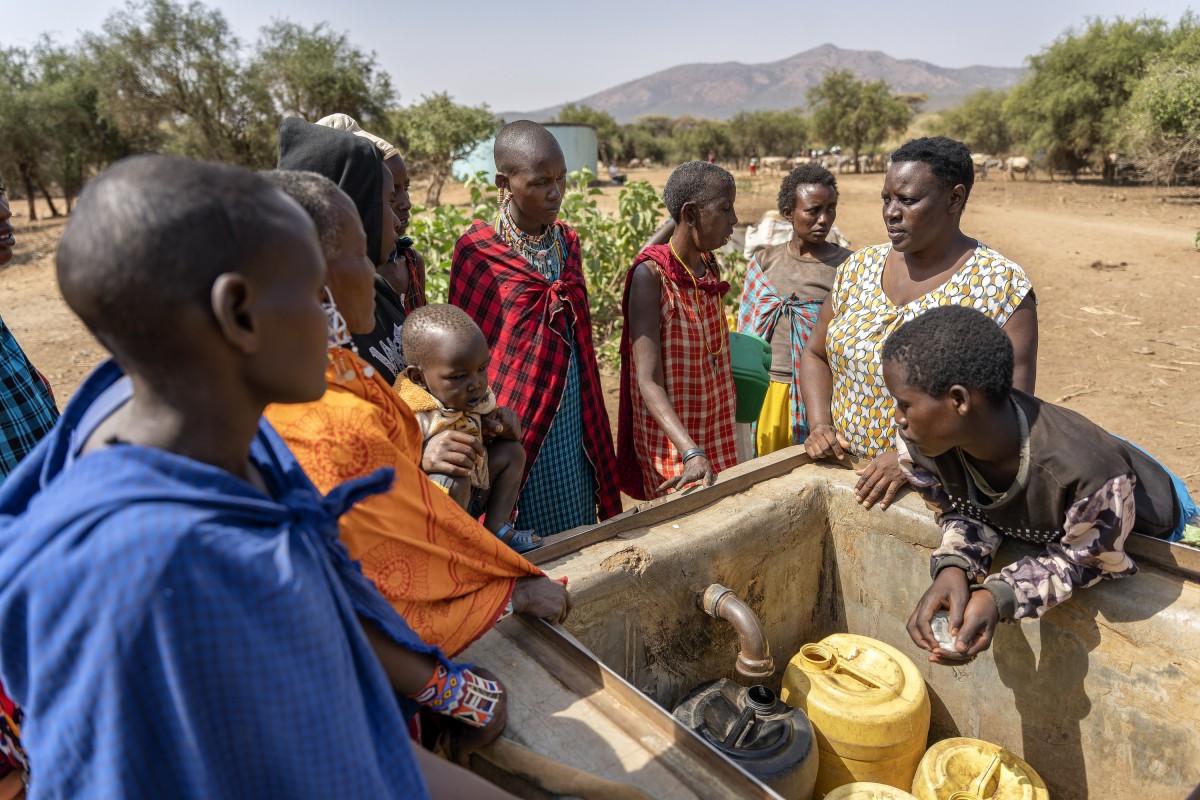Jane Nyamwamu about the impact of the Water Justice Fund: ‘Women can do magic’
On 4 July, the Water Justice Fund was officially launched in Kajiado County, Kenya. Jane Nyamwamu tells us about why she is so passionate about this new fund.

You were there at the launch of the Water Justice Fund: why was this such a big event?
‘It was an important moment with representatives of all six women groups and the WASH school-group that will receive a grant from the fund, County officials from the departments of Water, Climate change, Gender and social services, local administrators and the media present. And a great opportunity to discuss the challenges that women are facing: water scarcity because of climate change and the fact that they are often not represented in decision-making on these important topics. Government officials promised to mobilize more resources to tackle these issues and we will make sure that the women they addressed will follow-up on these promises.
For the County Integrated Development plan that is in the process of development, the women wrote a memo together, providing the government with input on what exactly they want to have incorporated in the plan. Finally completing stalled water projects: a community borehole that was drilled by a company but never completed in Olgos community, for example. The County government should also look for alternatives for boreholes that have dried up due to extreme drought. Even in Kajiado town there is water scarcity now, with people depending on expensive private boreholes. Women are coming out strongly demanding a county borehole and pipeline connections to households.’
Can you tell us more about these women groups?
‘The women groups that applied to the Water Justice Fund are groups that are already registered as community based organisations or self-help groups. They consist of 22 to 30 women. Some are relatively new, others are already active for four or five years. Some of the groups are involved in addressing water challenges and climate change adaptation initiatives in a small way. Water and climate are important topics for them, but also violence against women, and agricultural challenges.
In Kajiado town for example the women group consists of a mix of adolescents, young mothers and some older mothers. The oldest one is 37 years old. They try to find solutions for the struggle to take care of their families, which often involves forced prostitution in exchange for basic resources such as food, water, sanitary pads or money for school fees for their children. The women groups in the rural areas are also mixed, with the oldest woman being 70 years old, struggling with effects of prolonged and frequent droughts.’

What will these women groups do with the grant they receive from the Water Justice Fund?
‘One of the women groups, the Naishorua Self Help Group led by Lydia made a proposal for a pipeline extension from an existing borehole, more than 5 kilometers away from their village. With this pipeline extension to a water kiosk in their community they will save a lot of time. They will also be able to use the water for drip irrigation, a form of irrigation that uses the water very efficiently.
This will enable them to plant vegetables, beans, hay and corn, which they can use for their families and also partly sell for extra income. In the past irrigation was not necessary but because of climate change the pattern of frequent rain has changed into frequent droughts. Now, it will become easier for their children and especially girls to attend school since they will save a lot of time in search for water and will be able to buy the school items from the extra income.
They are also planning to use the time they save to create more awareness in their community around water, sanitation and climate change and the importance of growing trees to re-green the environment. They want to lobby their local government to allocate more resources for climate change projects and reserve more positions for women in decision-making committees and platforms.’
Climate change is putting the lives of women and girls in danger: can you explain why this is?
‘Fetching water from a borehole now often takes up most of the day for women and girls because they have to walk all the way, wait till the men have watered the livestock, then wait in line with all the other women before they can return with their heavy load. Especially when in periods of drought boreholes dry up, women need to walk even further to the remaining waterpoints. This can take from morning till the afternoon.
That means that they have little time left to do all the other chores that need to be done around the house, from tending the goats to cooking. Men do not always understand this and beat their wives for this. To make things worse, wildlife also becomes a bigger risk in times of drought. Elephants, cheetahs and lions are looking for water as well and this makes it dangerous to walk early in the morning to water points. Women also lack time to earn the money to purchase food, leading to malnutrition. Lack of water also affects hygiene at the household level leading to an increase of diseases like diarrhea, trachoma and ring worms.’
Why is it important to give money directly to women groups?
One of the women groups, the Engape Self-Help Group from Agnes Bene, wrote down their vision: a future with enough water for social and economic development for women and girls in Olgos village. ‘Empower a women’, they say, ‘and we will be able to turn around society. And this society will be a role model for other societies.’ These women dream big and are determined to make a change.
We received a lot of good proposals but the budget available was limited so we had to select the best. But there are many more groups who could benefit from the fund. Especially since the launch, women groups are reaching out to apply. There is a huge need, since Kajiado county is vast and we are currently only working in three small regions. It seems only a drop in the ocean, but still these women are the backbone of society. Give money to men and they will say: let’s buy livestock. Give it to women groups and they not only empower themselves but also empower society. They will utilize these small grants and do miracles with it.’
You are very passionate about this programme
‘I have a passion working for women and girls. I have seen how they can change the world if we strengthen their skills and capacity to lobby and fend for themselves. How we can climb the ladder by making government officials invest their budgets in a proper way, enabling women to move forward.
It is great to see the fruits of the seeds we planted. Women can really do magic. Even in a patriarchal society, where you have to be really persistent and resilient as a woman to be heard. But once you come out strongly, men will have to listen. We will keep talking and talking until they do.’
An important partner in the Water Justice Fund: NIA
Neighbours Initiatives Alliance (NIA) is a development organisation based in Kajiado County in Kenya working with pastoral communities. They were established in 1996 and are specialized in facilitating community empowerment, mainly through capacity strengthening and knowledge transfer, influencing and brokering useful linkages. NIA has an impressive track record and experience in implementing community anchored programs in Water, Sanitation and Hygiene (WASH), Health and Nutrition, Food Security, Governance and Economic Development. NIA is a longstanding partner of Simavi and co-developer of the Water Justice Fund.
Do you want to learn more about Water Justice Fund? Have a look at the programme page.

